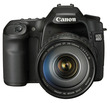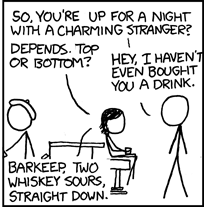Entries tagged as science
Sunday, February 8. 2009
ORF.at: Wie Computer sehen lernen

Der ORF hat einen Artikel zur von mir vorgestern erwähnten Ö1-Sendung nachgeworfen, offenbar als Vorschau auf die heutige Sendung „Matrix“ um 22.30h, in der es ebenfalls um Computer Vision bzw. maschinelles Sehen geht. Die Autoren erwähnen dabei auch die Möglichkeit, dass die Community für korrekt annotierte Trainingsdaten sorgt, die dann den Machine Learning-Algorithmen zur Verfügung stehen – eine Sache, die mich auch beruflich beschäftigt. Bin gespannt, wie sich das alles weiterentwickelt.
Friday, February 6. 2009
Ö1 Digital.Leben: Wie Digicams Gesichter erkennen

Es ist immer spannend, wenn das, womit man sich (z.B. beruflich) einhergehend beschäftigt, beginnt, sich allmählich in der Gesellschaft niederzuschlagen, vor allem wenn die Entwicklung zuvor von der Öffentlichkeit unbeobachtet in „Elfenbeintürmen“ (Labors, Forschungs- & Entwicklungsabteilungen, Uni-Instituten udgl.) stattgefunden hat. Es ist nämlich damit zu rechnen, dass Anwendersoftware bald in der Lage ist, Bild- und Videoinhalte tatsächlich auch zu sehen. So wäre etwa zu erwarten, dass in jüngerer Zukunft nach dem Hochladen eines Bildes in einem einschlägigen Webportal vorgeschlagen wird, das Bild z.B. mit den Schlagworten „Auto“, „rot“, „Straße“ oder „Strand“, „Meer“, „Küste“ zu versehen, sofern eine einschlägige Szene abgebildet ist.
Was bereits Realität ist, sind lernfähige Gesichtserkennungsfunktionen in aktuellen Digitalkameras und Bildverwaltungsanwendungen. Mit den technischen Hintergründen dieser nun Alltag gewordenen Funktion beschäftigte sich die gestrige Ö1-Sendung „Digital.Leben“.
Maschinelles Sehen
[...] Wir Menschen können Gesichter ganz gut anhand von winzigen Details unterscheiden, wie aber macht das ein Computer? Die Antwort weiß Horst Bischof, Professor für maschinelles Sehen an der Technischen Universität Graz.
Ich erlaube mir, hier eine Kopie des Podcasts zur Verfügung zu stellen:
Mehr zum Thema wird für die Ö1-Sendung „Matrix“ am Sonntag, 8. Februar, 22:30h angekündigt.
Friday, September 12. 2008
Finding dark places in Austria

Recently I took my first star trail images with my DSLR. There finally was no moon and clear sky, so I took my photo backpack and my tripod with me and drove at 2.00am a few kilometers outside the small town where we were staying that weekend. It was located in the Waldviertel (“Woodquarter”), a rather sparsely populated region at the north of Austria, and so I expected best conditions for taking pictures of a starry night. Indeed, the Milky Way was clearly visible. I pointed my camera northwards to capture the sky rotation, and although it was really dark, I was a little surprised that the trees silhouetted against the sky. And a long time exposure unveiled a faint orange glow at the horizon, although the next populated spot in that direction was a small village a few kilometers away.
This finally raised the question to me: How should I find the sparsest populated place within a certain radius? What data would I need to find that out? A set of coordinates of towns plus their number of inhabitants? Use that to compute an image and blur it? Or rather, is it possible to use data collected in the course of the light pollution issue?
By some research I was finally able to find
- the darkest place near the Waldviertel and
- the darkest place in Austria.
Continue reading "Finding dark places in Austria"
Wednesday, September 10. 2008
Nur für Physiker lustig

About
Calendar
| Mon | Tue | Wed | Thu | Fri | Sat | Sun |
|---|---|---|---|---|---|---|
| ← Back | February '26 | |||||
| 1 | ||||||
| 2 | 3 | 4 | 5 | 6 | 7 | 8 |
| 9 | 10 | 11 | 12 | 13 | 14 | 15 |
| 16 | 17 | 18 | 19 | 20 | 21 | 22 |
| 23 | 24 | 25 | 26 | 27 | 28 | |

